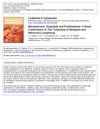 25 citations,
April 2019 in “Journal of The American Academy of Dermatology”
25 citations,
April 2019 in “Journal of The American Academy of Dermatology” Using 2% tofacitinib cream with narrowband ultraviolet B improved facial vitiligo by 70% in patients who didn't respond to previous treatments, with no side effects reported.
3 citations,
September 2021 in “EClinicalMedicine” ALRV5XR effectively increases hair density in men with androgenetic alopecia without adverse effects.
 122 citations,
November 1984 in “Journal of the American Academy of Dermatology”
122 citations,
November 1984 in “Journal of the American Academy of Dermatology” No single treatment is consistently effective for alopecia areata, and more research is needed.
4 citations,
January 2018 in “Journal of dermatology & dermatologic surgery” There is no gold standard treatment for hidradenitis suppurativa due to insufficient evidence.
 June 2023 in “NILES Journal forGeriatric and Gerontology/NILES Journal for Geriatric and Gerontology”
June 2023 in “NILES Journal forGeriatric and Gerontology/NILES Journal for Geriatric and Gerontology” Oral tranexamic acid is a safe and effective treatment for melasma.
 151 citations,
February 2007 in “International Journal of Dermatology”
151 citations,
February 2007 in “International Journal of Dermatology” Alopecia areata causes hair loss, has no cure, and various treatments exist.
23 citations,
October 2020 in “Anais brasileiros de dermatologia/Anais Brasileiros de Dermatologia” Tailored treatments for alopecia areata are recommended based on severity and patient needs.
 2 citations,
January 1990 in “Leukemia & Lymphoma”
2 citations,
January 1990 in “Leukemia & Lymphoma” The combination of mitoxantrone, etoposide, and prednisolone is effective for treating relapsed lymphoma with manageable side effects.
 85 citations,
October 2012 in “Dermatologic Clinics”
85 citations,
October 2012 in “Dermatologic Clinics” Alopecia Areata is an autoimmune condition often starting before age 20, with varied treatment success and a need for personalized treatment plans.
 1 citations,
September 2021 in “Skin appendage disorders”
1 citations,
September 2021 in “Skin appendage disorders” Botulinum toxin injections can help treat common hair loss in men, but more research is needed to confirm this and understand how it works.
 41 citations,
February 2001 in “Current pharmaceutical design”
41 citations,
February 2001 in “Current pharmaceutical design” Current and future treatments for alopecia areata focus on immunosuppression, immunomodulation, and protecting hair follicles.
1 citations,
January 2021 in “Skin appendage disorders” Alopecia areata in children is usually mild and effectively treated with strong topical steroids.
 4 citations,
June 2013 in “The Journal of Rheumatology”
4 citations,
June 2013 in “The Journal of Rheumatology” The document concludes that various findings in rheumatology offer insights into disease severity, treatment responses, and potential risks in medication, with some limitations due to unspecified participant numbers.
 27 citations,
May 2010 in “Dermatologic Clinics”
27 citations,
May 2010 in “Dermatologic Clinics” Zinc can be a helpful secondary treatment for certain skin conditions, but more research is needed to guide its use.
 11 citations,
October 2001 in “Dermatologic Clinics”
11 citations,
October 2001 in “Dermatologic Clinics” The document concludes that DAB389-IL2 is promising for treating refractory cutaneous T-cell lymphoma, but more research is needed on its effectiveness and side effect management.

TCA injections are more effective and safer than cryotherapy for treating alopecia areata.
 18 citations,
January 2017 in “Journal der Deutschen Dermatologischen Gesellschaft”
18 citations,
January 2017 in “Journal der Deutschen Dermatologischen Gesellschaft” High and low doses of prednisolone helped 62% of children with severe alopecia regrow hair with some weight gain and mild acne as side effects.
188 citations,
October 2014 in “Thyroid” Dabrafenib was effective and well tolerated in treating thyroid cancer with a specific mutation.
 June 2023 in “Journal of cosmetic dermatology”
June 2023 in “Journal of cosmetic dermatology” Both DPCP alone and with PRP are effective and safe for treating severe alopecia areata.
 1461 citations,
March 2004 in “Annals of oncology”
1461 citations,
March 2004 in “Annals of oncology” Pegylated liposomal doxorubicin is as effective as conventional doxorubicin but causes fewer heart problems and side effects.
 29 citations,
October 1988 in “Journal of Steroid Biochemistry”
29 citations,
October 1988 in “Journal of Steroid Biochemistry” Antiandrogens are effective for conditions like prostate cancer and skin issues, but more research is needed to confirm their benefits and minimize side effects.
 11 citations,
February 2003 in “Baillière's best practice & research. Clinical obstetrics & gynaecology/Baillière's best practice and research in clinical obstetrics and gynaecology”
11 citations,
February 2003 in “Baillière's best practice & research. Clinical obstetrics & gynaecology/Baillière's best practice and research in clinical obstetrics and gynaecology” Acne and increased body hair in teenage girls are normal but severe cases may need hormone evaluation and treatment can prevent diabetes linked to PCO.
74 citations,
February 2011 in “Headache The Journal of Head and Face Pain” Sumatriptan injections, high-flow oxygen, and verapamil effectively treat cluster headaches.
 9 citations,
July 1995 in “Veterinary Clinics of North America: Small Animal Practice”
9 citations,
July 1995 in “Veterinary Clinics of North America: Small Animal Practice” The document concludes that hair loss in cats is caused by various factors, including allergies, mites, infections, and hormonal issues, with treatments varying accordingly.
 October 2015 in “Elsevier eBooks”
October 2015 in “Elsevier eBooks” Aldesleukin can treat certain cancers and increase HIV patient CD4+ counts but often causes severe side effects.
 60 citations,
June 1997 in “Drugs & Aging”
60 citations,
June 1997 in “Drugs & Aging” Mitoxantrone with a corticosteroid helps manage symptoms for some advanced prostate cancer patients but doesn't extend life.
 February 2021 in “International journal of research in dermatology”
February 2021 in “International journal of research in dermatology” A boy's hair, nails, and skin improved after 6 months of steroid treatment.
 August 2024 in “JAMA Dermatology”
August 2024 in “JAMA Dermatology” Continuous baricitinib is needed to keep hair regrowth in severe alopecia areata.
4 citations,
February 2023 in “Frontiers in Oncology” Nano-Pulse Stimulation™ Therapy is more effective and less damaging than cryoablation for treating melanoma tumors in mice.
4 citations,
October 2018 in “JAMA Dermatology” Ruxolitinib may help treat hair loss and symptoms in patients with chronic graft-versus-host disease.





















